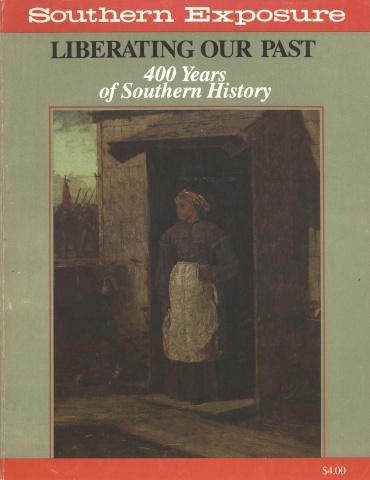Past and Present

This article originally appeared in Southern Exposure Vol. XII No. 6, "Liberating Our Past." Find more from that issue here.
In three years of fieldwork with Roman Catholics in Savannah, Georgia, I have studied the relations of "history" to current problems of identity and community. Contemporary divisions, whether by neighborhood, class, race, ethnic group, or gender, not only have shaped different historical experiences, but also have led people to distinctive interpretations of the past. Furthermore, how we look at a city's past reflects competition and power in the present as much as any earlier events.
A simple yet striking example clarifies this. In the summer of 1982, a re-enactment of "Historic Events Involving Blacks During the British Occupation of Savannah" was staged by the Savannah- Yamacraw Branch of the Association for the Study of Afro-American Life and History. The drama portrayed the British freeing of slaves and the foundation of the first black Baptist congregation. The audience was primarily black. The staging ended with a predominantly white re-enactment of the battle between the British and the American colonists.
The next day, a local newspaper detailed the event "from the perspective of a French soldier fighting alongside Americans in the year 1782." In an 11-paragraph story, the role of the black sponsors and actors was reduced to the observation that "Negroes who had sought shelter here throughout the British occupation watched in horror as the chance for an extension of their short-lived freedom disappeared along with the smoke from the battlefield."*
Black and white visions of history came together briefly for the pageant itself. Yet what the souvenir brochure and black newspapers treated as a celebration of action and creation in Savannah history was for the daily news a white event watched by some passive "Negro" spectators. Ownership of the past is not equally recognized or distributed.
Differences such as these are not surprising to anthropology, which has long seen variance in myths within non-Western societies as a sign of social differentiation. Yet the implications of pluralistic historical consciousness need more discussion in Southern historiography, both in abstract terms and concrete practice.
Is it enough, for example, to recognize that groups have been ignored or eclipsed, and merely to bring their data to light according to external norms, academic or journalistic? History is told in many ways. Historiography must learn to listen to other voices, and to value their meaning in their social contexts. Henry Glassie's observations in Passing the Time in Ballymenone on Irish society and history seem particularly relevant here:
I do not believe that the academic history of the West, founded as it is on the needs of an elite regional minority, can be directed through revision to satisfaction. It will never expand to true global democracy, nor will it alone provide a base for a full theory of human history. I believe a history useful to all humankind will come only if we first submit to the rigor of treating the world's many histories as independent cultural constructions. . . .
There is one past but many histories. We think of one of them — our own — as "history" and the others as "folk histories" but they are all either histories or all folk histories.
Even more important, this wider sense of history can incorporate the academic historian into the progressive application of his or her research and analysis and toward a critique of the structures by which power groups have expropriated history as much as any other aspect of society: their ownership of historical landmarks or genealogical connections to recognized "heroes," and even their definition of what is significant, whether in public pageants or academic textbooks. By whose terms, after all, is a cannon charge in a Civil War battle more worthy of historical commemoration than the day-to-day struggle of the slave against degradation and dehumanization? To learn to value other experiences, styles, and personal meanings, and to bring these forth as history, too, is to critique structures of expropriation and perhaps to challenge them.
Each year, as I go back to Savannah, I renew a dialogue about history — bringing my ideas and interpretations, listening, teaching, sharing, and learning to value others' experiences. Savannah has changed my sense of the role of an anthropological historian and a Southerner in his own society. All of us, professional historian or not, must understand the structures of ownership of the past, and critique them more completely, in order to understand and change the South.
* R. Merkel, "Americans Win City Once Again," Savannah Morning News, July 12, 1982, p. B:l.
Tags
Gary McDonogh
Gary McDonogh teaches anthropology at the New College of the University of South Florida. (1984)